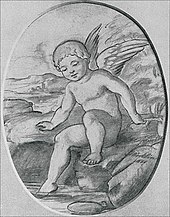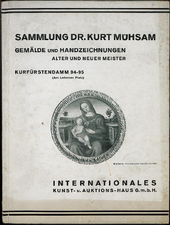Kurt Mühsam
Kurt Mühsam (born May 3, 1882 in Graz , Austria-Hungary ; died November 17, 1931 in Berlin ) was an Austrian journalist , film critic and writer .
Life
Kurt Mühsam was the second youngest of nine children of Rabbi Samuel Mühsam and Marianne Löwenstein. He was a cousin of the four years older German anarchist Erich Mühsam .
Laboriously studied law and philosophy in Vienna and Graz, and after completing his doctorate in 1908, worked at the Graz Regional Court . As a student he made several educational trips to Italy, Greece and Asia Minor.
In 1909 he became the Berlin correspondent of the New Free Press in Vienna . In 1910 he reported from Crete that they wanted to join Greece. In 1911 he married Alice Freymark (1889–1968), daughter of a director of the Disconto-Gesellschaft , Isidor Freymark, who was still successful as a restorer in her second half of life . They had three children: Ruth Marton (1912), Gerd Muehsam (1913) and Helmut Victor Muhsam (1914), and one of the nannies they employed was for a time the poet Gertrud Kolmar . Alice Mühsam managed to escape from Nazi persecution in 1940, supported by her children, whose professional lives had been broken by persecution since 1933.

From 1912 Mühsam worked in Berlin as a dramaturge at the theater in Königgrätzer Strasse , at the Komödienhaus and at the Berlin theater .
Laboriously worked for the National-Zeitung and the BZ am Mittag between 1912 and 1921 . During the First World War he shared the enthusiasm of the German population for war, wrote war books and was a war correspondent on the Western Front . After the war, he headed the press department of UFA (Universum-Film AG) in 1922/23 and from 1924 on, alongside Egon Jacobsohn , he designed the film section in the BZ am Mittag. From 1924 to 1927 he was also editor-in-chief of the film magazine Lichtbild-Bühne .
Laboriously suffered a traffic accident on November 16, 1931 and died the following day. He was buried in the Heerstrasse cemetery, and the funeral speech was given by Max Osborn .
An art lover was hard work: 367 objects from his art collection were offered at an auction in 1932.
Fonts (selection)
- Salon people: 4 one-act games . Berlin: Kraus, 1911
- The sun boy . 1911
- Hippolytus , 1913. Performed in 1924
- Germania and Austria. A festival on the occasion of the 25th anniversary of the reign of Kaiser Wilhelm II . On behalf of the Austro-Hungarian Tribute Committee. Berlin: Linddruckerei- and Publishing Company, 1913
- Hindenburg, the liberator of East Prussia . 1914
- German military leaders in world wars: their becoming and work . 2 volumes. Berlin: Haber, 1914
- Our fliers over enemy territory: documents from World War 1914 . Berlin: Borngräber, 1914
- How we were lied to: The official deception of the German people . Munich: Langen, 1918
- Animals in the movies . 1922
- The art auction: Licht- u. Downsides d. Auctioning in art and Antique trade . Berlin: Verlag für Kunstwissenschaft, 1923
- with Egon Jacobsohn : Lexicon of the film . Berlin: Verlag der Lichtbildbühne, 1924
- International encyclopedia of prices for paintings and hand drawings in all schools and countries: Based on auction results over the last few decades . Berlin: Journal "The Collection Cabinet" E. Reiss, 1925
- Professional guide for film and cinema . Dessau: C. Dünnhaupt, 1927
Radio plays
- 1925: Friedrich Schiller : Wilhelm Tell (Walter, Tell's son) - Director: Hermann Beyer (broadcast, radio play adaptation - NORAG )
literature
- Hard work, Kurt, Doctor of Law. , in: Joseph Walk (ed.): Short biographies on the history of the Jews 1918–1945 . Munich: Saur, 1988, ISBN 3-598-10477-4 , p. 273
- Salomon Wininger : Great Jewish National Biography . Entries in Volume 4, Chernivtsi, 1930 and Volume 7, Chernivtsi, 1936
- Mühsam, Kurt , in: Renate Heuer : Lexicon of German-Jewish Authors , Volume 17, Munich: De Gruyter, pp. 197–201
Web links
- Literature by and about Kurt Mühsam in the catalog of the German National Library
- Literature by and about Kurt Mühsam in the bibliographic database WorldCat
- Dianne Ritchey, Stanislav Pejša: Guide to the Papers of the Muehsam Family, 1828-1999 , at Leo Baeck Institute New York, Center for Jewish History, 2003
- International Art and Auction House Berlin (ed.): Collection Dr. Kurt Mühsam Berlin: Paintings and hand drawings by old and new masters; Auctioned January 23, 1932 (Catalog No. 97) , Berlin, 1932, at the University of Heidelberg
Individual evidence
- ↑ Mühsam, Alice , in: Ulrike Wendland: Biographical Handbook of German-speaking Art Historians in Exile. Life and work of the scientists persecuted and expelled under National Socialism . Munich: Saur, 1999, ISBN 3-598-11339-0 , pp. 447f.
- ^ Vossische Zeitung, November 21, 1931, quoted by Ulrich Döge: "He just has a hot heart": the publisher and film entrepreneur Karl Wolffsohn . Hamburg: tredition, 2016 ISBN 978-3-7345-5311-0
| personal data | |
|---|---|
| SURNAME | Hard, Kurt |
| BRIEF DESCRIPTION | Austrian journalist, film critic and writer |
| DATE OF BIRTH | May 3, 1882 |
| PLACE OF BIRTH | Graz |
| DATE OF DEATH | November 17, 1931 |
| Place of death | Berlin |

